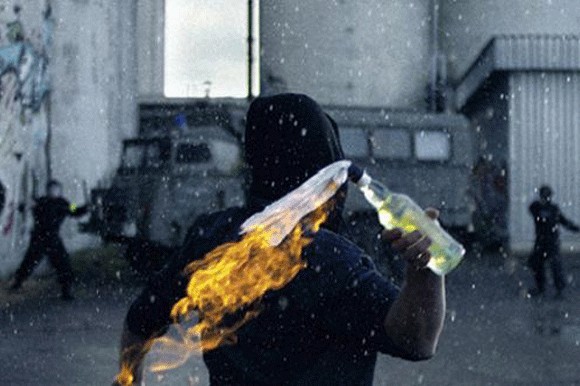Whether genre or arthouse, auteur or action cinema: the Feature Film Competition offers a broad range of productions that the audience will be delighted to watch and discuss. The two Polish contributions exemplify the diversity of the competition: From the large-scale production WARSAW 44 (Poland 2014, director: Jan Komasa) – a youthful and contemporary, suspense-packed portrayal of the Warsaw Uprising, which has already attracted more than a million spectators to Polish cinemas – to equally topical and explosive independent films such as HARDKOR DISKO (Polen 2014), Krzysztof Skonieczny’s debut.
In HARDKOR DISKO, we accompany young Marcin, impressively played by Marcin Kowalczyk, on a very personal vendetta against a neo-bourgeois Warsaw family. The film takes up a theme recurring in several competition films, to which different answers are given: The search for one’s appropriate place in life. In THE DISOBEDIENT (Serbia 2014), Leni and Lazar lead a life and relationship that evade any kind of definition and interference by the parent generation. The feature film debut by the young Serbian director Mina Djukić is a facilely staged bicycle road movie through the northern Serbian plains of Vojvodina.
CORN ISLAND (Georgia, Germany, France, Czech Republic, Kazakhstan 2014), TEST (Russia 2014) and THE OWNERS (Kazakhstan 2014) show how adhering to physical places can be a meaningful element for societies undergoing radical change, bringing one’s own survival and the family, or what’s left of it, to the fore. While CORN ISLAND by George Ovashvili and TEST by Alexander Kott, with their fascinating landscape images of the Kazakh steppe and the Caucasus, do almost without any dialogues in their portrayals of the older and younger generations living together in turbulent times, Adilkhan Yerzhanov’s THE OWNERS features ironic breaks at unexpected moments. Three siblings struggle for a bit of home in a Kazakh village that is led by a corrupt elite. “We shall all die, so let’s dance” is one line in the film offering a grandiose swan song of a post-communist society. THESE ARE THE RULES (Croatia, France, Serbia, Macedonia 2014), the fourth feature film by the Croatian director Ognjen Sviličić, relates how a normal family life is thrown out of joint by an unforeseeable incident – with great empathy in a merciless chronicle of events. The place par excellence for communal life is the tenement building. In the Hungarian-French-South Korean co-production FREE FALL (2014), György Pálfi takes us to the abysses of human coexistence behind closed doors.
Ivan Tverdovsky sheds light on the sensitive and volatile interpersonal structure of a school class in his full-length feature film debut CORRECTIONS CLASS (Russia, Germany 2014). Lena sits in a wheelchair and is at first warmly welcomed by the special school class for epileptics, little persons and youths with Down’s syndrome. But when she and handsome Anton come nearer to each other, the atmosphere changes to the contrary: Rejected Misha incites everyone to take revenge.
The Austrian-Slovenian co-production THE WOODS ARE STILL GREEN (2014) is the first German-language film in the competition in a long while: The new feature film by the Slovenian director Marko Naberšnik tells the story of two soldiers of the imperial and royal troops who during the First World War fight a senseless battle at a height of 2,200 meters and even in the face of death adhere to the imperial hierarchies – a chamber drama in an open landscape that condenses the theme of war to an interpersonal psychological study.
From pitch to screen – two productions that were pitched as projects at connecting cottbus in 2011 and 2012 will have their German premieres in this year’s competition. In Juris Kursieti’s MODRIS (Latvia, Greece, Germany 2013), the eponymous protagonist searches for his father. Isa Qosja’s THREE WINDOWS AND A HANGING (Kosovo 2014) shows the impressive fight of a young village schoolteacher against the patriarchal hierarchies in a society that has left war behind but has still not found social harmony.
The 24th edition of the FilmFestival Cottbus will open on 4 November in the large auditorium of the Staatstheater Cottbus with the premiere of the German version of Kornél Mundruczó’s WHITE GOD (Hungary, German, Sweden 2014).
The 24th FilmFestival Cottbus is supported by, among others, the State of Brandenburg, the Medienboard Berlin-Brandenburg GmbH, the City of Cottbus, and its first partners Vattenfall and Creative Europe - MEDIA.
Press contact:
Katrin Wollnik / Andreas Lange
+49 355 4310 7 -14/ -26
This email address is being protected from spambots. You need JavaScript enabled to view it.




















